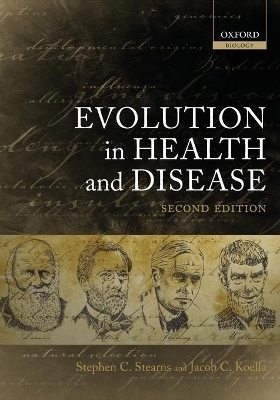
Evolution in Health and Disease
Oxford University Press (Verlag)
978-0-19-920746-6 (ISBN)
In this fully revised and updated edition, the editors have integrated a completely new set of contributions from the leading researchers in the field to describe the latest research in evolutionary medicine, providing a fresh summary of this rapidly expanding field 10 years after its predecessor was first compiled. It continues to adopt a broad approach to the subject, drawing on medically relevant research from evolutionary genetics, human behavioural ecology, evolutionary microbiology (especially experimental evolution of virulence and resistance), the evolution of aging and degenerative disease, and other aspects of biology or medicine where evolutionary approaches make important contributions.
Evolution in Health and Disease describes how evolutionary thinking gives valuable insights and fresh perspectives into human health and disease, establishing evolutionary biology as an essential complementary science for medicine. Integrating evolutionary thought into medical research and practice helps to explain the origins of many medical conditions, including diabetes, obesity, cardiovascular disease, asthma, allergies, other autoimmune diseases, and aging. It also provides life-saving insights into the evolutionary responses of pathogens to antibiotics, vaccinations, and other human interventions. Why are we vulnerable to disease? Why are our bodies not better designed? Are unpleasant surprises in store as we use more antibiotics and vaccines? Why do we respond to inappropriately to so many modern conditions? How do cancers evolve? Why must we grow old? The book discusses answers to these and many other questions while suggesting new approaches to treatment and research.
This research-level text is suitable for graduate-level students and researchers in the fields of evolutionary (Darwinian) medicine, evolutionary biology, anthropology, developmental biology, and genetics. It will also be of relevance and use to medical researchers and doctors.
Professor Stearns specializes in life history evolution, which links the fields of ecology and evolutionary biology, in evolutionary medicine, and in evolutionary functional genomics. He came to Yale in 2000 from the University of Basel, Switzerland, where he had been professor of zoology since 1983 and held several administrative posts. Prior to moving to Basel he was an assistant professor in the Biology Department at Reed College in Oregon. Born in Hawaii and a 1967 graduate of Yale College, Stearns earned a M.S. from the University of Wisconsin and a Ph.D. from the University of British Columbia. Professor Koella's interests lie in the coevolution of parasites and hosts. He specializes in the evolutionary epidemiology of malaria and in the application of evolutionary ideas to the control of malaria. After obtaining a Masters' in mechanical engineering at the ETH Zurich and a PhD in evolutionary biology at the University of Basel he worked for several years at the Swiss Tropical Institute Basel as a malaria epidemiologist before moving on to positions in Switzerland, Denmark and France. He arrived at Imperial College in 2005 as a Chair in Epidemiology.
PART I. INTRODUCTION ; PART II. THE HISTORY AND VARIATION OF HUMAN GENES ; PART III. NATURAL SELECTION AND EVOLUTIONARY CONFLICTS ; PART IV. PATHOGENS: RESISTANCE, VIRULENCE, VARIATION, AND EMERGENCE ; PART V. NONINFECTIOUS AND DEGENERATIVE DISEASE
| Erscheint lt. Verlag | 1.12.2007 |
|---|---|
| Zusatzinfo | 56 b&w line; 1 halftone illustrations |
| Verlagsort | Oxford |
| Sprache | englisch |
| Maße | 188 x 246 mm |
| Gewicht | 883 g |
| Themenwelt | Studium ► 2. Studienabschnitt (Klinik) ► Humangenetik |
| Studium ► Querschnittsbereiche ► Epidemiologie / Med. Biometrie | |
| Naturwissenschaften ► Biologie ► Evolution | |
| Naturwissenschaften ► Biologie ► Humanbiologie | |
| ISBN-10 | 0-19-920746-1 / 0199207461 |
| ISBN-13 | 978-0-19-920746-6 / 9780199207466 |
| Zustand | Neuware |
| Informationen gemäß Produktsicherheitsverordnung (GPSR) | |
| Haben Sie eine Frage zum Produkt? |
aus dem Bereich


